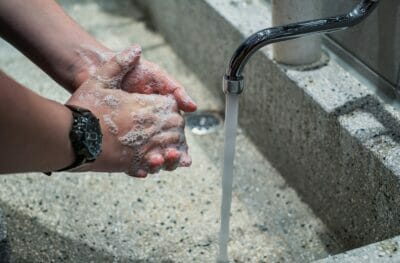You may have heard that hand washing is one of the best ways to prevent the spread of many diseases. When people get educated about proper handwashing and then utilize this knowledge correctly, illness rates improve dramatically across group populations.
But how does this work? And what is the difference between hand sanitizer and good old-fashioned soap-and-water handwashing?
This article explores the science behind how clean hands help prevent disease outbreaks such as C. difficile diarrhea (C. diff). We will also discuss when gloves can get used in addition to thorough handwashing, so you can keep yourself and your loved ones safe during flu season and all year long!
Washing After Washroom Visits
When you are in the washroom, it is vital to wash your hands thoroughly. You can do this every time you use the toilet and before you come out. You do not want to pick up germs on your way out that you will transfer to another person or object by touching them with your dirty hands.
Handwashing must happen properly to avoid germs and ensure C. Diff precautions to prevent its spread. Make sure to wet your hands first, then apply soap and lather it all over, taking care to scrub under nails and in between fingers. After 20 seconds have passed, rinse off the soap by rubbing your hands together under running water for at least 10 seconds before drying them well with a clean paper towel or air dryer.
When going through these steps, you should not touch any surfaces as they may harbor bacteria; use a paper towel or elbow instead of bare skin when turning off the tap or opening doors!
You can also apply an alcohol-based hand sanitizer gel when washing is not possible. This product comes in small bottles, which are handy for carrying around with you so that no matter where you are during day-to-day life, there is always an easy way to keep your hands clean!
A Crucial Part of Food Preparation
You can wash your hands frequently when preparing food, especially after handling raw meat. The bacteria on your hands can contaminate the food and lead to illness. To achieve proper handwashing:
- You apply soap after your hands are wet with clean running water (hot or cold).
- Lather well by rubbing your hands together with the soap.
- Scrub for at least 15 seconds.
- Rinse under running water.
- Dry thoroughly with a clean towel or air dryer
Coming Back From Office
You can ensure a few safety tips before indulging in cooking after coming from work.
- Wash your hands right after you come home and before starting to prepare food.
- Wash your hands with soap and water for at least 20 seconds.
- Ensure you wash all surfaces of your hand.
- Use a clean towel to dry off or let them air-dry completely.
Caring for the Unwell
You should wash your hands before and after caring for a sick person, especially if they are at home. When caring for an ill person, you should also wash your hands before and after:
- Helping them eat or use the bathroom.
- Handling any medical equipment.
- Touching their laundry.
Sneezing, Coughing, or Blowing Your Nose
- Do not neglect to clean your hands after you sneeze, cough, or blow your nose.
- When you wipe or blow your nose, germs from the tissue can spread on your hand. If you do not wash them, it becomes easy for germs to spread.
- If you sneeze in a tissue, it goes without saying that you should wash your hands afterward. But what if you did not have a tissue available?
- The same goes for blowing and wiping your nose. Even if you use a handkerchief (for environmental reasons), ensure to cleanse afterward.
Hand Sanitizers to Your Routine
Hand sanitizers are an effective and efficient way to keep your hands clean. Use hand sanitizers that have 60-95% alcohol for maximum effectiveness. Using hand sanitizer with a higher percentage of alcohol does not equate to more effectiveness.
The CDC recommends using hand sanitizer only if soap and water are not available, reminding us that handwashing is the gold standard for hygiene. Hand sanitizer should not be used as a substitute for thorough washing with soap and water when hands are visibly dirty or greasy.
Conclusion
If you are going to get sick, it is better to feel it with a cold than the flu. Hence handwashing practices should be kept up year-round. You can wash your hands any time they are in contact with germs, such as after using the bathroom, before caring for someone sick, or before handling food. Hand sanitizers are great additions when hand washing isn’t available, but hand washing is always preferred.
